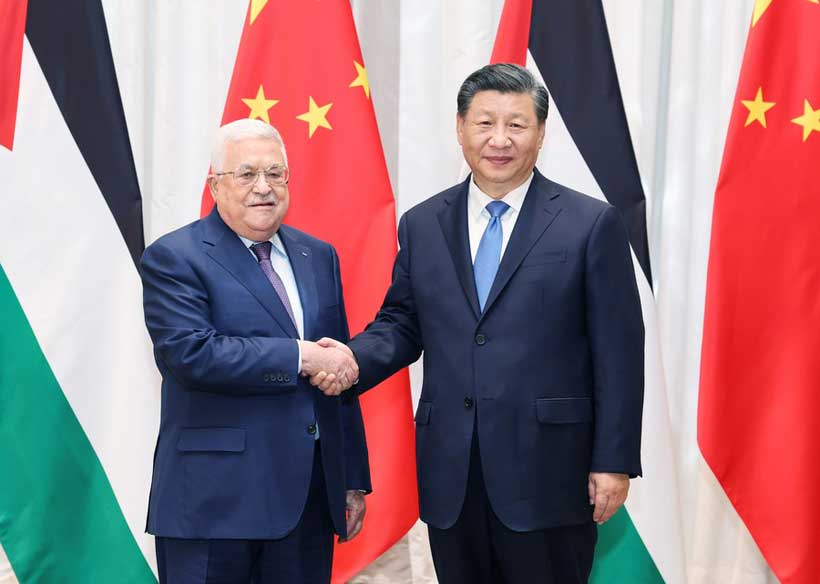beijingwalker
ELITE MEMBER

- Joined
- Nov 4, 2011
- Messages
- 65,187
- Reaction score
- -55
- Country
- Location
MIDDLE EAST
China Could Become the Last Resort to the Ongoing Palestine-Israel Conflict
October 17, 2023
Chinese President Xi Jinping meets with Palestinian President Mahmoud Abbas in Riyadh, Saudi Arabia, Dec. 8, 2022. (Xinhua/Yao Dawei)
Although China started to play a more active role in the Middle East, the Beijing government is still reluctant to mediate in the region’s peace process. Beijing’s main focus in the Middle East is still primarily economic. The rapprochement between Riyadh and Tehran, mediated by the Chinese, also has economic benefits behind energy deals and investment agreements.
One issue in the Middle East in which China consistently remains neutral is the Palestine-Israel conflict. Although China has historically supported Palestine and offered a middle ground in peace talks, the government is still unwilling to side with one particular party over the years directly.
However, China has become more proactive in the latest war between Israel and Palestine. The Chinese government has reiterated that the attacks on civilians can assure no security. The statement did not mention any specific country or point blame on one side. The Chinese special envoy has spoken with multiple regional parties and will soon visit the Middle East to resolve the conflict.
However, as the ongoing war between Israel and Palestine reaches an unprecedented level and could become a complete humanitarian disaster, Beijing may have no option but to fully mediate to protect its economic interests. At the same, Beijing could become the last resort for the peace between the two nations.
The existing mechanism for peace between Palestine and Israel is dying. It may be the time for a new potential solution and a road map for peace. Thirty years after the signing of the Oslo Accord, the violence has not stopped. Indeed, the peace accord has provided a helpful road map towards stability and peace. However, the bloodshed has never stopped even with the peace treaty. The conflict between Israel and Palestine has exploded multiple times, from the conflict in 2001 to the ongoing war between Israel and Hamas. These signs point towards a bleak reality that the Oslo Peace Accords are dead. A new plan for the peace is in desperate need.
The time for a new solution has arrived, and China has a new vision for a peaceful solution. Throughout history, China has been a supporter of the two-state solution. Currently, the Chinese proposed a four-point peace plan in 2017. China further mentioned it again in 2021 during the UN Security Council meeting. The Four Point plan calls for an independent Palestine State while taking immediate measures to end the violence targeting civilians from both sides. During the recent conflict, China still calls for a peaceful solution while communicating with both parties and the countries in the region.
Meanwhile, China is a trustworthy partner in this case. China has a clear track record of its neutral stands on the issue. China does not have an immediate political interest in the region, which gives it further credit for trust. China has consistently supported a two-state solution while providing political support to PLO. PLO opened its representative office in Beijing in the 1960s and obtained an embassy status, and its leadership visited China frequently over the years. All of these provided extra credit for becoming a potential middleman for future talks. China has also successfully mediated the talks between Saudi Arabia and Iran, indicating the capacity to facilitate such peace talks in the region. Although the conflict occurs in Gaza, where the Ramallah government lacks control, China still works closely with the Palestinian Authority in previous conflicts.
Although China has expressed dissatisfaction over the escalation of the conflict from the Israeli government, China and Israel still have a decent relationship. China is Israel’s second-biggest trading partner while the negotiation for a free trade agreement is ongoing. Meanwhile, Netanyahu and Abbas visited China one day apart in 2013, indicating some trust between the two nations.
Also, from Beijing’s perspective, deeper involvement in world affairs is almost inevitable as its economic interests grow. The peaceful Middle East suits the Chinese vision and strategic interests perfectly. In its four-point plan, China has clearly stated that it considers both Israel and Palestine essential partners for the BRI. Although China lacks the motivation to break down the security and political structure of the Middle East led by the United States, Beijing still needs a stable Middle East from an economic perspective. It gives Beijing the necessity to secure stability in the region.
Also, from a moral perspective, providing a middle ground for the negotiations helps build the Chinese image. The Beijing government has pursued an image of a peacebuilder in recent years. Its success in facilitating the Iran-Saudi Arabia negotiation proves that China is now playing a pivotal role in the region. The current conflict between Israel and Palestine could boost China’s image as a peace builder and further secure the support it already receives in the Middle East. The Middle East is vital to the Chinese economic interests with energy deals and future investment opportunities. A stronger moral and political position could secure Chinese economic benefits in the foreseeable future.
Beijing has shown a greater interest in playing a critical role in Middle Eastern politics. Palestine-Israel conflict is no different. China may be the last resort to solve the peace. The utter failure of the existing peace agreement, the traditional relationship between Beijing and both the Palestine Authority and the Israeli government, and the Chinese determination to protect its economic interest could make China the perfect mediator for potential peace talks in the future.

China Could Become the Last Resort to the Ongoing Palestine-Israel Conflict
Although China started to play a more active role in the Middle East, the Beijing government is still reluctant to mediate in the region's


